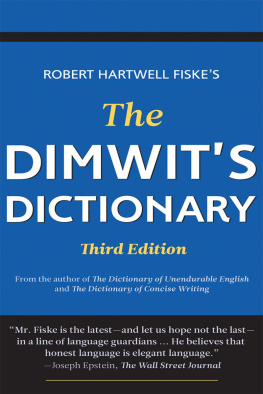
Other Books by Robert Hartwell Fiske
Robert Hartwell Fiskes Dictionary of Unendurable English The Best Words
The Dictionary of Concise Writing 101 Elegant Paragraphs
Vocabula Bound 1: Outbursts, Insights, Explanations, and Oddities (editor) Vocabula Bound 2: Our Wresting, Writhing Tongue (editor)

Published by Marion Street Press
4207 SE Woodstock Blvd # 168
Portland, OR 97206-6267
USA
http://www.marionstreetpress.com/
Orders and review copies: (800) 888-4741
Copyright 2012 by Robert Hartwell Fiske
All rights reserved.
Printed in the United States of America
ISBN 978-1-933338-98-9
Cover art direction by Nicky Ip
Back cover photo by Susan Hedman
Library of Congress Cataloging-in-Publication Data pending
Contents
Chapter 1
Expressions That Dull Our Reason and Dim Our Insight.
Chapter 2
Writing That Demands to Be Read Aloud, Speech That Calls to Be Captured in Print
The great enemy of clear language is insincerity. When there is a gap between ones real and ones declared aims, one turns as it were instinctively to long words and exhausted idioms, like a cuttlefish squirting out ink.
George Orwell, Politics and the English Language
Thoughts, that breathe, and words, that burn.
Thomas Gray, The Progress of Poesy
For I have neither wit, nor words, nor worth,
Action, nor utterance, nor the power of speech,
To stir mens blood
William Shakespeare, Julius Caesar, act 3, scene 2
Watch your thoughts; they become words.
Watch your words; they become actions.
Watch your actions; they become habits.
Watch your habits; they become character.
Watch your character; it becomes destiny.
Anonymous
How very convenient these clich phrases are; how soothing to the pained mind, and how misleading, how concealing.
Iris Murdoch, The Sea, The Sea
Never do I ever want to hear another word. There isnt one I havent heard.
Alan Jay Lerner and Frederick Loewe, My Fair Lady

A Note on the Second Edition
Aside from new entries and commentary, throughout this second edition, you will find quotations from classic and contemporary authors of fiction. These quotations, however well written they or their surrounding words may be, are marred, adulterated by dimwitticisms:
What you find out in your thirties is that clever children are a dime a dozen.Christina Schwarz, All Is Vanity
a dime a dozen is a dimwitticism.
But I can remember that from quite early on, for some reason, Isabel decided that Edith was rather a feather in her cap, someone that little bit special to be fed to her country neighbours in rationed morsels.Julian Fellowes, Snobs
a feather in her cap is a dimwitticism.
The two women were simply aiding and abetting each other to disband the Seraglio.Penelope Fitzgerald, Human Voices
aiding and abetting is a dimwitticism.
It has been a true labor of love, and something morethe only thing that has kept her calm during the long winter months of waiting for the hearing to begin.Anita Shreve, Fortunes Rocks
a labor of love is a dimwitticism.
For the time being he could see the line in the sand: on one side of it, all he had; on the other, all hed lose.Martin Amis, Yellow Dog
line in the sand is a dimwitticism.
Poor Nelson. He has this bee in his bonnetdoing something for this girl nobody knows.John Updike, Rabbit Remembered
bee in his bonnet is a dimwitticism.
And now the dog was dead, and Morris was saying that, as the dog should have known, his was a losing battle, and that that not given in love would be redressed in blood.David Mamet, The Old Religion
a losing battle is a dimwitticism.
The do-gooder, the bleeding heart, the concerned citizen, the militant reformer: what a pain in the neck they are: always making us feel guilty about something.Edward Abbey, The Fools Progress: An Honest Novel
a pain in the neck is a dimwitticism.
She gave me a rather disparaging look and took out a tin of Golden Virginia, which she opened to reveal a layer of tiny neat joints packed in like sardines.Kate Atkinson, Emotionally Weird
packed in like sardines is a dimwitticism.
Each dimwitticism is a failure to write clearly and compellingly, an admission that the author could not manage an original thought or a better turn of phrase, or could not be bothered to think of one.
Dimwitticisms, as these examples make clear, yield only facile writing, only false sentiment.
A Note on the Third Edition
With the publication of this third edition, The Dimwits Dictionary has been in print for more than fifteen years. Few books about words last so long. Almost all the word books that are written today are silly, indeed, insulting, narratives that talk down to people. Books of this sort rarely remain in print for long. You may disagree with the thesis of this book, but I offer a serious argument that has captured the interest of enough people to warrant the release of a third edition.
In this new edition, along with adding many more dimwitticisms, sentence examples, and commentary, I have identified the top-twenty dimwitticisms. Each of these entries is followed by the rubric A Top-Twenty Dimwitticism.
In 2006 and 2007, Factiva, a Dow Jones Company, provided The Vocabula Review with monthly graphs showing the top-twenty dimwitticisms used in U.S., U.K., Canadian, Australian, and Indian newspapers and magazines. I had supplied Factiva with a list of 200 dimwitticisms, and they searched for the terms among thousands of publications. Appendix A shows the graphs for April 2007.
To this third edition, I have also added more examples from works of fiction. The readability of a work of fiction is directly proportional to the number of dimwitticisms its author uses. The more dimwitticisms an author uses to help him tell his tale, the less readable the writing, the less compelling the story, the less able the author.
It is quite impossible to record every dimwitticismthere is simply no end to thembut those I have noted here are a good selection. Study them, and you will soon recognize all others. Substitute them, as I suggest, and you will soon no longer need to.
Foreword
W hen Robert Hartwell Fiske confronts Saint Peter, I hope he remembers to tell the man that he is the founding editor of The Vocabula Review, the online magazine devoted to contemporary language, its delights and its disasters. Saint Peter will immediately understand that Mr. Fiske has been on the side of the angels and therefore been doing the Lords work. My worry is that, in reply, Saint Peter will commit one or another of the solecisms, illogicalities, or barbarisms that Mr. Fiske spends his days excoriating and that he will feel the need to correct him, causing him to lose his place on the other side of the gates. Meanwhile, on this side of the gates, to hew to this theological metaphor a bit longer, Robert Hartwell Fiske has been doing a hell of a job.
Next page










